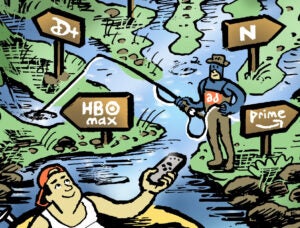Tom Edwards is different from most of the other people flowing through the halls of the McEnery Convention Center in San Jose at Facebook’s F8 developers conference this week.
Because Edwards isn’t a developer. He’s the chief digital officer at marketing services firm Epsilon.
“There aren’t a lot of agency folks here,” Edwards said. “I’m sort of like a mole, trying to think of use cases and how the technology applies for brands and advertising.”
Facebook’s ambitious plan to turn the camera into an open augmented-reality platform, which Mark Zuckerberg laid out on stage at F8 Tuesday, has Edwards excited.
“From an advertising perspective, we can start to move from traditional content marketing to the notion of effect-based advertising based on individuals and location,” Edwards said. “The environment becomes the driver for a piece of advertising to be shown or experienced.”
Ad load may be maxing out in the news feed, but the news feed can help unlock the camera as a platform to build advertising around. In theory, anything posted in the news feed can become advertising inventory.
It wouldn’t be too out there for an outdoors brand like REI or Moosejaw to target people camping in the woods with funny location-triggered filters – maybe the ability to add a Bigfoot photobomb? – and share helpful, possibly interactive, content like, “How to start a fire” or “Tasty campfire meals.”
But you can’t make s’mores around the campfire unless someone remembered to buy graham crackers, marshmallows and chocolate beforehand.
And that’s where a suggestion from M, Facebook’s virtual assistant within Messenger, has a role to play, Edwards said. If M knows that someone is about to go camping because it has access to that person’s calendar, it can pop up ahead of time with recommendations and reminders on what to buy.
 “That’s where AI and object-based recognition can connect, where an M suggestion can drive future actions,” Edwards said.
“That’s where AI and object-based recognition can connect, where an M suggestion can drive future actions,” Edwards said.
Nothing as seamless as that is happening yet, but the stage is set in terms of existing consumer behavior.
“Consumers have shown a propensity to move from social media to social messaging, and with visual storytelling has come the shift to things like stickers and emoji,” Edwards said. “Building on that, I can see effects becoming the new normal and redefining the approach advertisers take to content marketing, making it less about messaging and more about enabling experiences through cool effects.”
Snapchat paved the way for lightweight AR experiences, Pokemon Go accustomed people to weaving location into the experience and now Facebook is planning to go in the for the kill by opening its Camera Effects platform to developers.
Facebook’s scale – 1.86 billion monthly active users and 1.2 billion MAUs on Messenger – make it a compelling monetization channel for creators, a bit like the YouTube of augmented reality.
Going down that route could also help Facebook diversify its revenue stream away from advertising, something Facebook needs to address, Edwards said. Of the $26.8 billion in revenue Facebook generated in 2016, the vast majority of that – around 84% – was due to mobile ads.
“When driving views and engagement makes money for creators, creators make more content, and it becomes a self-sustaining model, like what Google did with YouTube,” Edwards said. “That’s where I think Facebook is going with this.”
Building an open platform around augmented reality will also create a playground for marketing and creative technologists, Edwards said.
“They’re going to have a field day with this, because it’s about more than just creating and posting a shareable piece of social content, it’s about enhancing experiences – and for that, data is pivotal,” Edwards said. “To create the right effects for the right experiences, brands will need to know what’s relevant, and that’s very different from advertising that forces something on a user.”













